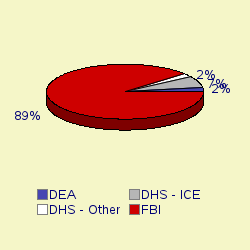
Terrorism-International Convictions for 2017
Number Year-to-date 44 Percent Change from previous year 7.3 Percent Change from 5 years ago 33.3 Percent Change from 10 years ago -6.4 Percent Change from 20 years ago 4300
Table 1: Criminal Terrorism-International ConvictionsThe latest available data from the Justice Department show that during FY 2017 the government reported 44 new terrorism-international convictions. According to the case-by-case information analyzed by the Transactional Records Access Clearinghouse (TRAC), this number is up 7.3% over the past fiscal year when the number of convictions totaled 41.
The comparisons of the number of defendants convicted for terrorism-internatio offenses are based on case-by-case information obtained by TRAC under the Freedom of Information Act from the Executive Office for United States Attorneys (see Table 1).
Compared to five years ago when there were 33, the number of FY 2017 convictions of this type is up 33.3 percent. Convictions over the past year are still lower than they were ten years ago. Overall, the data show that convictions of this type are down 6.4 percent from the level of 47 reported in 2007 but up 4300 percent from the level of 1 reported in 1997.
The long term trend in terrorism-international convictions for these matters going back to FY 1997 is shown more clearly in Figure 1. The vertical bars in Figure 1 represent the number of terrorism-international convictions of this type recorded each fiscal year. Each presidential administration is distinguished by the color of the bars. To view trends month-by-month rather than year-by-year, see TRAC's monthly report series for the latest data.
Leading Investigative Agencies
The lead investigative agency for terrorism-international convictions through September 2017 was "Justice - Federal Bureau of Investigation" accounting for 88.6 percent of convictions.
As shown in Figure 2, additional agencies with substantial numbers of terrorism-international convictions were: Homeland Security - Immigration and Customs Enforcement (6.8%), "Homeland Security - Other" (2.3%), "Justice - Drug Enforcement Administration" (2.3%).
Top Ranked Lead Charges
Table 2 shows the top lead charges recorded in the convictions of terrorism-international matters filed in U.S. District Court during FY 2017.
Lead Charge Count Rank 1 yr ago 5 yrs ago 10 yrs ago 20 yrs ago 18 USC 2339B - Provide material support to foreign terrorist orgs 21 1 1 1 12 - More 18 USC 2339 - Harboring or Concealing Terrorists 8 2 2 5 12 2 More 07 USC 2024 - Food Stamp Program - Violations and Enforcement 3 3 14 - - - More 18 USC 371 - Conspiracy to commit offense or to defraud US 2 4 14 3 4 2 More 18 USC 554 - Smuggling goods from the United States 1 5 14 - - - More 18 USC 844 - Explosives - Importation and storage of explosives 1 5 14 19 12 2 More 18 USC 875 - Interstate Communications 1 5 8 19 12 2 More 18 USC 956 - Conspire to kill/kidnap/maim person or damage property foreign country 1 5 14 5 12 - More 18 USC 1030 - Fraud and related activity - computers 1 5 14 19 - - More 18 USC 1038 - False Information and Hoaxes 1 5 14 19 - - More 18 USC 1952 - Racketeering -interstate/foreign travel/transport 1 5 8 - - - More 18 USC 1960 - Prohibition of illegal money transmitting business 1 5 8 - - - More 18 USC 2339A - Providing material support to terrorists 1 5 4 5 5 2 More 22 USC 2778 - Control of arms exports and imports 1 5 8 19 5 2 More
Table 2: Top charges for convictions
"Provide material support to foreign terrorist orgs" (Title 18 U.S.C Section 2339) was the most frequent recorded lead charge. Title 18 U.S.C Section 2339 was ranked 1st a year ago, while it was the 1st most frequently invoked five years ago. It was ranked 12th ten years ago.
Ranked 2nd in frequency was the lead charge "Harboring or Concealing Terrorists" under Title 18 U.S.C Section 2339. Title 18 U.S.C Section 2339 was ranked 2nd a year ago, while it was the 5th most frequently invoked five years ago. It was ranked 12th ten years ago and 2nd twenty years ago.
Ranked 3rd was "Food Stamp Program - Violations and Enforcement" under Title 7 U.S.C Section 2024.
Again among the top ten lead charges, the one showing the sharpest decline in convictions compared to one year ago—down -67 percent—was "Providing material support to terrorists " (Title 18 U.S.C Section 2339 ). This was the same statute that had the largest decrease—-33%—when compared with five years ago.
Top Ranked Judicial Districts
Understandably, there is great variation in the number of terrorism-international convictions in each of the nation's ninety-four federal judicial districts. The districts registering the largest number of convictions of this type during the first twelve months of FY 2017 are shown in Table 3.
Judicial District Count Rank Fla, S 9 1 More Minnesota 9 1 More Ill, N 3 3 More S Car 3 3 More Wisc, E 3 3 More Virg, E 2 6 More Cal, C 1 7 More Colorado 1 7 More Fla, N 1 7 More Kansas 1 7 More N Car, W 1 7 More N. Y., E 1 7 More N. Y., S 1 7 More N. Y., W 1 7 More Nevada 1 7 More Ohio, S 1 7 More Penn, E 1 7 More Texas, E 1 7 More Texas, S 1 7 More Utah 1 7 More Wisc, W 1 7 More
Table 3: Top 10 districts
The Southern District of Florida (Miami) and District of Minnesota—with 9 convictions—were the most active through September 2017.
The Northern District of Illinois (Chicago), District of South Carolina and Eastern District of Wisconsin (Milwaukee) now rank 3rd.
Report Generated: January 16, 2018


